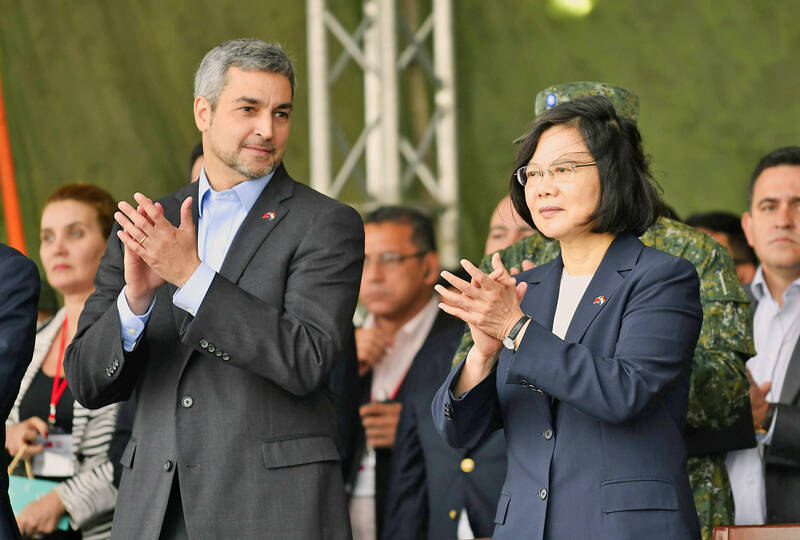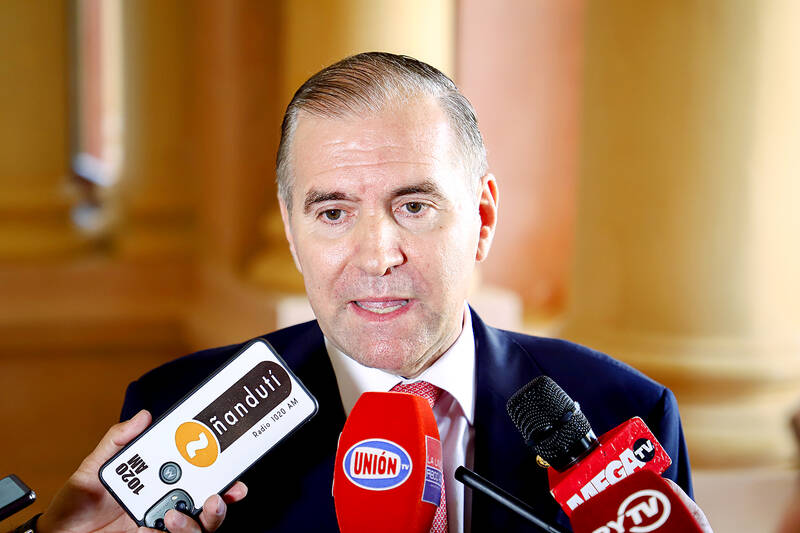Paraguay’s relationship with Taiwan is not based on a “quid pro quo,” Ministry of Foreign Affairs spokeswoman Joanne Ou (歐江安) yesterday cited the country’s foreign minister as telling Ambassador to Paraguay Jose Han (韓志正).
The statement came hours after the Financial Times reported that Paraguayan President Mario Abdo Benitez had asked Taipei to invest US$1 billion in his country to maintain diplomatic ties.
Paraguayan Minister of Foreign Affairs Julio Cesar Arriola had clarified the remarks and told the ambassador that the ties between the countries are based on shared values and close bilateral cooperation, Ou said.

Photo: SAM YEH, AFP
The Financial Times reported that Abdo asked for the investment as it would help him resist “enormous” pressure from Beijing to switch diplomatic recognition to China.
“We are working with the president of Taiwan ... so that the Paraguayan people feel the real benefits of the strategic alliance,” the newspaper cited him as saying during a trip to the US.
“There is Taiwanese investment of more than US$6 billion in countries which don’t have diplomatic relations with Taiwan, we want from that US$1 billion to be put in Paraguay,” he is cited as saying. “That will help us to build the argument about the importance of this strategic alliance with Taiwan... Imagine what the [agricultural] producers say when meat prices fall and they don’t have access to China. They ask you: ‘Please, we have to open up to the Chinese market. What does Taiwan give us when we are a country which could sell its entire soy and meat output to China?’”

Photo: EPA-EFE
Cesar told Han that the Paraguayan president merely meant to say that his country would be the perfect location for Taiwanese investment, Ou said.
Abdo has been a staunch supporter of Taiwan over the past few years and has repeatedly reaffirmed that Taiwan-Paraguay ties would remain unchanged as long as he is in office, Ou said.
As for investment opportunities, Ou said that Taiwan had sent two delegations to Paraguay this year and the government continues to encourage Taiwanese investment in Paraguay, which has one of the most stable political and economic systems in Latin America.
More Taiwanese investment in Paraguay would have profound significance for the two countries’ strategic partnership, the ministry told the Financial Times by e-mail in response to Abdo’s remarks.
Ou said Abdo on Wednesday attended a signing ceremony between Taiwan’s International Cooperation and Development Fund (ICDF) and the Paraguayan Development Finance Agency, showing that he has maintained close relations with Taiwan.
The development fund donated US$5 million for the creation of the Paraguayan Guarantee Fund for Women, which seeks to empower the country’s women in the post-COVID-19 pandemic era, the ICDF said.
Taiwan has 14 diplomatic allies. Paraguay is the only country in South America that recognizes Taipei instead of Beijing.
Since President Tsai Ing-wen (蔡英文) took office in May 2016, Taiwan has lost eight diplomatic allies: Burkina Faso, the Dominican Republic, El Salvador, Kiribati, Nicaragua, Panama, Sao Tome and Principe, and the Solomon Islands.

SECURITY: As China is ‘reshaping’ Hong Kong’s population, Taiwan must raise the eligibility threshold for applications from Hong Kongers, Chiu Chui-cheng said When Hong Kong and Macau citizens apply for residency in Taiwan, it would be under a new category that includes a “national security observation period,” Mainland Affairs Council (MAC) Minister Chiu Chui-cheng (邱垂正) said yesterday. President William Lai (賴清德) on March 13 announced 17 strategies to counter China’s aggression toward Taiwan, including incorporating national security considerations into the review process for residency applications from Hong Kong and Macau citizens. The situation in Hong Kong is constantly changing, Chiu said to media yesterday on the sidelines of the Taipei Technology Run hosted by the Taipei Neihu Technology Park Development Association. With

A US Marine Corps regiment equipped with Naval Strike Missiles (NSM) is set to participate in the upcoming Balikatan 25 exercise in the Luzon Strait, marking the system’s first-ever deployment in the Philippines. US and Philippine officials have separately confirmed that the Navy Marine Expeditionary Ship Interdiction System (NMESIS) — the mobile launch platform for the Naval Strike Missile — would take part in the joint exercise. The missiles are being deployed to “a strategic first island chain chokepoint” in the waters between Taiwan proper and the Philippines, US-based Naval News reported. “The Luzon Strait and Bashi Channel represent a critical access

CARROT AND STICK: While unrelenting in its military threats, China attracted nearly 40,000 Taiwanese to over 400 business events last year Nearly 40,000 Taiwanese last year joined industry events in China, such as conferences and trade fairs, supported by the Chinese government, a study showed yesterday, as Beijing ramps up a charm offensive toward Taipei alongside military pressure. China has long taken a carrot-and-stick approach to Taiwan, threatening it with the prospect of military action while reaching out to those it believes are amenable to Beijing’s point of view. Taiwanese security officials are wary of what they see as Beijing’s influence campaigns to sway public opinion after Taipei and Beijing gradually resumed travel links halted by the COVID-19 pandemic, but the scale of

Pope Francis is be laid to rest on Saturday after lying in state for three days in St Peter’s Basilica, where the faithful are expected to flock to pay their respects to history’s first Latin American pontiff. The cardinals met yesterday in the Vatican’s synod hall to chart the next steps before a conclave begins to choose Francis’ successor, as condolences poured in from around the world. According to current norms, the conclave must begin between May 5 and 10. The cardinals set the funeral for Saturday at 10am in St Peter’s Square, to be celebrated by the dean of the College